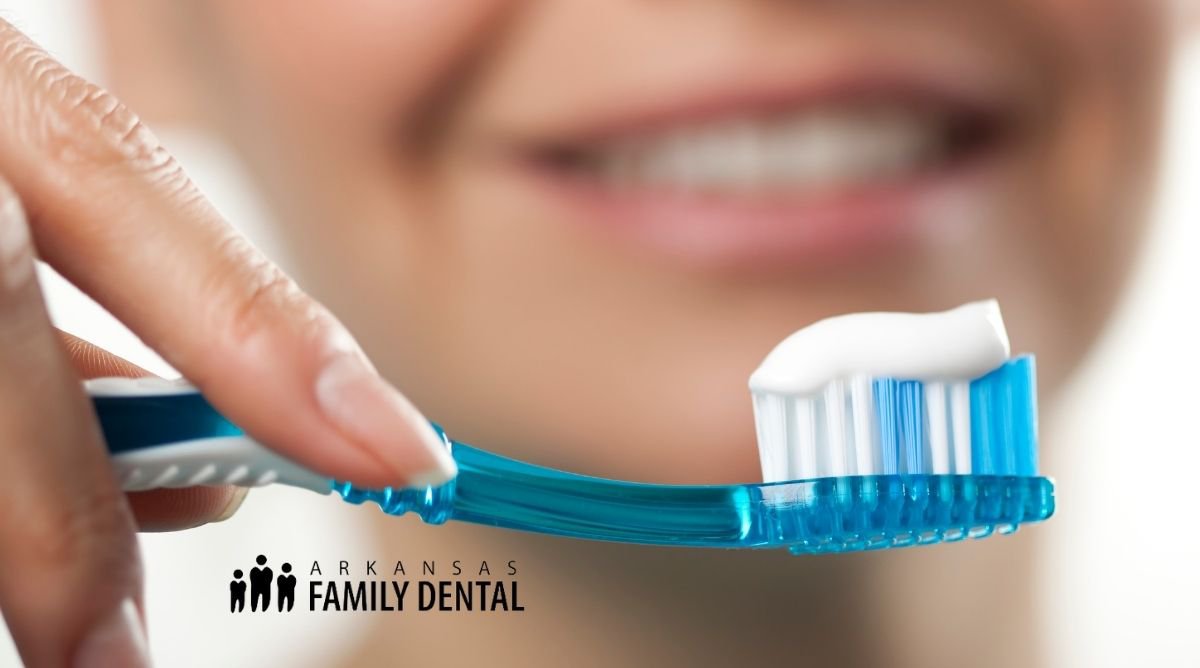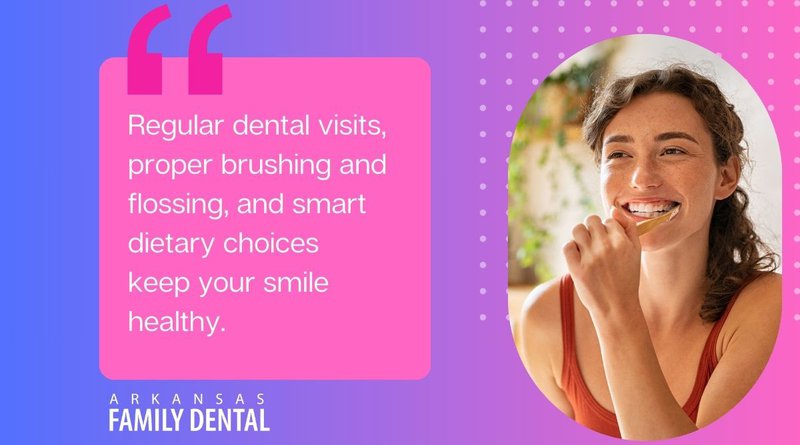Proper Dental Hygiene: Are You Doing It Right?

April 15, 2025
Brushing twice a day isn’t enough if you’re skipping key steps in your routine. Many people believe they have proper dental hygiene, but small mistakes can lead to cavities and gum issues. Are you flossing before or after brushing? Using mouthwash at the right time? Making the best food choices for strong teeth? Let’s break down proper dental care so you can protect your smile the right way.
Key Takeaways:
- Brush twice a day and floss once daily to prevent plaque buildup, cavities, and gum disease.
- Best order: Firstly, floss, brush second, finish with mouthwash to remove bacteria.
- Use fluoride toothpaste and a soft-bristled toothbrush; brush for two minutes using gentle circular motions.
- Morning routine: Brush after waking up, wait 30–60 minutes after acidic meals before brushing.
- Night routine: Important for preventing overnight plaque buildup; floss and use fluoride mouthwash.
- Oral hygiene impacts overall health, reducing risks of heart disease, stroke, and complications from diabetes.
- Limit sugar consumption; eat dairy, leafy greens, and crunchy vegetables for stronger teeth.
- Use ADA-approved fluoride toothpaste; avoid harsh abrasives.
- Visit the dentist twice a year for cleanings and early detection of issues.
- Do not rinse immediately after brushing to let fluoride stay on teeth.

The Essential Steps for Proper Daily Dental Hygiene
Keeping your teeth and gums healthy starts with a solid daily routine. Without proper care, plaque can build up, leading to cavities and gum disease. A good daily oral care routine supports both oral and overall health.
Brushing and Flossing
You should brush twice a day and floss once a day. Brushing removes plaque and food particles from tooth surfaces. Flossing clears bacteria and debris from between teeth, where a toothbrush cannot reach. If plaque hardens into tartar, only a licensed dental professional, such as a dental hygienist or dentist, can effectively remove it. Skipping flossing increases the risk of gum disease and cavities.
The Correct Order for Brushing, Flossing, and Mouthwash
The best order is floss, brush, then mouthwash. Flossing first loosens plaque and food between teeth, allowing brushing to sweep it away while applying fluoride from toothpaste. Mouthwash provides a final rinse, removing any remaining particles and bacteria.
Using fluoride toothpaste strengthens enamel and helps prevent cavities. When brushing, hold the toothbrush at a 45-degree angle to the gumline, using small, gentle circles to clean without harming your gums. Brushing should last two full minutes.
The Best Morning and Night Oral Care Habits
In the morning, brushing removes plaque that builds up overnight. Drinking water before breakfast helps wash away bacteria before eating. After breakfast, wait 30 minutes to an hour before brushing if you had acidic foods like juice, which can weaken enamel.
At night, brushing and flossing are even more important. Bacteria thrive when the mouth is dry during sleep. Removing all food debris before bed prevents overnight plaque buildup. Using a fluoride mouthwash before bed adds extra protection while sleeping.
A consistent routine, along with good oral hygiene habits, helps prevent costly dental treatments. A simple, thorough approach keeps your smile strong for years to come.
Brushing Technique For Proper Dental Hygiene
Brushing correctly keeps your mouth healthy. A poor technique can damage enamel and leave plaque behind. Hold your toothbrush at a 45-degree angle to your gumline, using small, circular motions instead of scrubbing back and forth. Scrubbing too hard wears down enamel, making teeth sensitive and more prone to cavities. A soft-bristled toothbrush cleans effectively without harming gums or enamel.
Flossing should come before brushing for the best results. It removes plaque and food from between teeth, so fluoride from toothpaste can reach those areas. Brushing first leaves plaque in those spaces, increasing the risk of tooth decay and gum disease. If flossing is difficult, consider floss picks, water flossers, or tiny interdental brushes.
Mouthwash should be used after brushing to remove leftover bacteria. Fluoride mouthwash strengthens enamel, reducing cavity risk. Antibacterial mouthwash helps control bad breath and gum disease. Alcohol-free options work well for those with dry mouth. Use mouthwash at least 30 minutes after brushing to allow the fluoride to work.
Skipping these steps allows plaque to build up, leading to gum disease and cavities. A consistent routine of brushing, flossing, and mouthwash keeps your teeth strong and your breath fresh. Learn more from the CDC.
Key Benefits of Maintaining Proper Dental Hygiene
Good oral hygiene does more than keep your breath fresh. It helps prevent serious problems like gum disease, tooth decay, and even heart disease.
Oral Hygiene and Overall Health?
Poor oral health can lead to infections beyond the mouth. Bacteria in plaque can enter the bloodstream, increasing the risk of heart disease, strokes, and lung infections. Gum disease can also make diabetes harder to control, and poor hygiene during pregnancy has been linked to premature birth.
Long-Term Benefits of Good Dental Habits
Brushing and flossing daily keep teeth strong and gums healthy. Clean teeth make it easier to chew healthy foods. Good oral hygiene also improves confidence by maintaining a bright smile and avoiding painful dental procedures like root canals or extractions.
Health Risks Are Linked to Poor Oral Hygiene
Neglecting oral care can cause cavities, gum infections, and tooth loss. Plaque buildup hardens into tartar, leading to inflammation and gum disease. Severe gum disease, or periodontitis, can damage the jawbone and loosen teeth. Oral infections may contribute to problems like pneumonia and digestive issues.
Brushing twice a day, flossing daily, and visiting a dentist regularly can protect both oral and overall health. Learn more from this guide on proper oral hygiene.
Diet and Oral Health
Sugar and Tooth Decay
Eating sugar produces acid in the mouth, which weakens enamel and leads to cavities. Sugary snacks and drinks like soda, candy, and cookies raise the risk of decay. Even foods like dried fruit stick to teeth and feed harmful bacteria. Drinking water after eating sugar helps rinse away residue and maintains proper dental hygiene.
The Best Foods for Strong Teeth
Dairy products, crunchy vegetables, and nuts support strong teeth. Milk, cheese, and yogurt contain calcium and phosphates that repair enamel. Crunchy foods like carrots, celery, and apples help clean teeth. Leafy greens, almonds, and salmon provide minerals that support bone health. Drinking water throughout the day also helps remove food particles and bacteria.
Vitamins For Healthy Gums and Teeth
Vitamins A, C, and D, along with calcium, strengthen teeth. Vitamin A (found in carrots and spinach) helps saliva production. Vitamin C (in oranges and bell peppers) promotes gum health. Additionally, Vitamin D (from sunlight and fish) helps the body absorb calcium, which strengthens bones and teeth. Eating nutrient-rich foods promotes better oral health.
The Best Tools and Products for Proper Dental Hygiene
Choosing the Best Toothbrush
A soft-bristled toothbrush removes plaque without irritating gums. A small head helps reach tight areas, especially at the back of the mouth. Electric toothbrushes are often better at controlling plaque with their vibration or rotation. Replace your toothbrush every three to four months or when the bristles fray.
Ingredients to Look for in Toothpaste
Fluoride is key for strengthening enamel and preventing cavities. The ADA Seal of Acceptance ensures effectiveness. Sensitivity toothpaste may contain potassium nitrate, while stannous fluoride fights plaque and gingivitis. Avoid toothpaste with harsh abrasives that damage enamel.
Rinsing After Brushing
As common as it is, rinsing immediately washes away fluoride before it works. Spit out the extra toothpaste but let the fluoride stay on your teeth. If needed, wait at least 30 minutes before drinking water or using mouthwash.
Regular dental visits, proper brushing and flossing, and smart dietary choices keep your smile healthy. Prioritizing oral care prevents future problems and supports overall health.
Keep Your Smile Healthy with Proper Dental Hygiene
Maintaining good dental hygiene is key to preventing cavities, gum disease, and other oral health issues. Brushing twice a day, flossing regularly, and visiting your dentist for routine checkups help keep your teeth and gums in top shape. A healthy smile not only boosts confidence but also supports overall well-being. At Arkansas Family Dental, we’re committed to helping you achieve and maintain excellent oral health. Schedule an appointment today and take the next step toward a brighter, healthier smile!
Connect With
Call (501) 232-6273 or request an appointment online to set up your first visit. We’ll be in touch soon.
